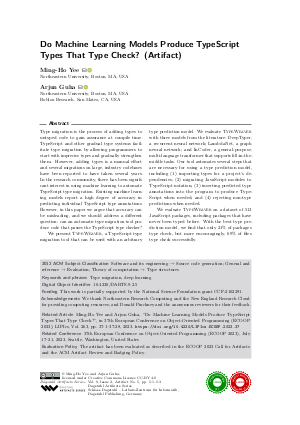Do Machine Learning Models Produce TypeScript Types That Type Check? (Artifact)
Authors
Ming-Ho Yee  ,
Arjun Guha
,
Arjun Guha 
-
Part of:
Issue:
Special Issue of the 37th European Conference on Object-Oriented Programming (ECOOP 2023)
Part of: Volume: DARTS, Volume 9 (ECOOP 2023)
Part of: Conference: European Conference on Object-Oriented Programming (ECOOP)
Part of: Journal: Dagstuhl Artifacts Series (DARTS) - License:
 Creative Commons Attribution 4.0 International license
Creative Commons Attribution 4.0 International license
- Publication Date: 2023-07-11
Artifact Description

PDF
DARTS.9.2.5.pdf
- Filesize: 0.58 MB
- 3 pages
Document Identifiers
Subject Classification
ACM Subject Classification
- Software and its engineering → Source code generation
- General and reference → Evaluation
- Theory of computation → Type structures
Keywords
- Type migration
- deep learning
Metrics
- Access Statistics
-
Total Accesses (updated on a weekly basis)
0PDF Downloads0Metadata Views
Abstract
Type migration is the process of adding types to untyped code to gain assurance at compile time. TypeScript and other gradual type systems facilitate type migration by allowing programmers to start with imprecise types and gradually strengthen them. However, adding types is a manual effort and several migrations on large, industry codebases have been reported to have taken several years. In the research community, there has been significant interest in using machine learning to automate TypeScript type migration. Existing machine learning models report a high degree of accuracy in predicting individual TypeScript type annotations. However, in this paper we argue that accuracy can be misleading, and we should address a different question: can an automatic type migration tool produce code that passes the TypeScript type checker? We present TypeWeaver, a TypeScript type migration tool that can be used with an arbitrary type prediction model. We evaluate TypeWeaver with three models from the literature: DeepTyper, a recurrent neural network; LambdaNet, a graph neural network; and InCoder, a general-purpose, multi-language transformer that supports fill-in-the-middle tasks. Our tool automates several steps that are necessary for using a type prediction model, including (1) importing types for a project’s dependencies; (2) migrating JavaScript modules to TypeScript notation; (3) inserting predicted type annotations into the program to produce TypeScript when needed; and (4) rejecting non-type predictions when needed. We evaluate TypeWeaver on a dataset of 513 JavaScript packages, including packages that have never been typed before. With the best type prediction model, we find that only 21% of packages type check, but more encouragingly, 69% of files type check successfully.
Cite As Get BibTex
Ming-Ho Yee and Arjun Guha. Do Machine Learning Models Produce TypeScript Types That Type Check? (Artifact). In Special Issue of the 37th European Conference on Object-Oriented Programming (ECOOP 2023). Dagstuhl Artifacts Series (DARTS), Volume 9, Issue 2, pp. 5:1-5:3, Schloss Dagstuhl – Leibniz-Zentrum für Informatik (2023)
https://doi.org/10.4230/DARTS.9.2.5
BibTex
@Article{yee_et_al:DARTS.9.2.5,
author = {Yee, Ming-Ho and Guha, Arjun},
title = {{Do Machine Learning Models Produce TypeScript Types That Type Check? (Artifact)}},
pages = {5:1--5:3},
journal = {Dagstuhl Artifacts Series},
ISSN = {2509-8195},
year = {2023},
volume = {9},
number = {2},
editor = {Yee, Ming-Ho and Guha, Arjun},
publisher = {Schloss Dagstuhl -- Leibniz-Zentrum f{\"u}r Informatik},
address = {Dagstuhl, Germany},
URL = {https://drops.dagstuhl.de/entities/document/10.4230/DARTS.9.2.5},
URN = {urn:nbn:de:0030-drops-182456},
doi = {10.4230/DARTS.9.2.5},
annote = {Keywords: Type migration, deep learning}
}
Author Details
Funding
This work is partially supported by the National Science Foundation grant CCF-2102291.
Acknowledgements
We thank Northeastern Research Computing and the New England Research Cloud for providing computing resources; and Donald Pinckney and the anonymous reviewers for their feedback.
Artifact
DARTS-9-2-5-artifact-415b9ed685645c24f95d500d099c4c08.tar.gz
(Filesize: 0.62 GB)
MD5 Sum:
415b9ed685645c24f95d500d099c4c08
(Get MD5 Sum)
Artifact Evaluation Policy
The artifact has been evaluated as described in the ECOOP 2023 Call for Artifacts and the ACM Artifact Review and Badging Policy
Related Article
- Ming-Ho Yee and Arjun Guha, "Do Machine Learning Models Produce TypeScript Types That Type Check?", in 37th European Conference on Object-Oriented Programming (ECOOP 2023), LIPIcs, Vol. 263, pp. 37:1-37:28, 2023. https://doi.org/10.4230/LIPIcs.ECOOP.2023.37
References
- Creative Commons. Attribution 4.0 International (CC BY 4.0). https://creativecommons.org/licenses/by/4.0/. Accessed: 2023-05-25.
- Docker Inc. Docker. https://www.docker.com/. Accessed: 2023-05-25.
- Podman. Podman. https://podman.io/. Accessed: 2023-05-25.
- The Linux Foundation. Open Container Initiative. https://opencontainers.org/. Accessed: 2023-05-25.
